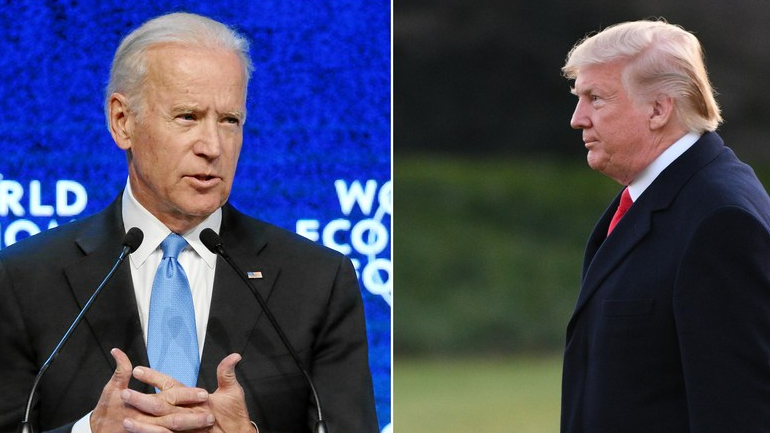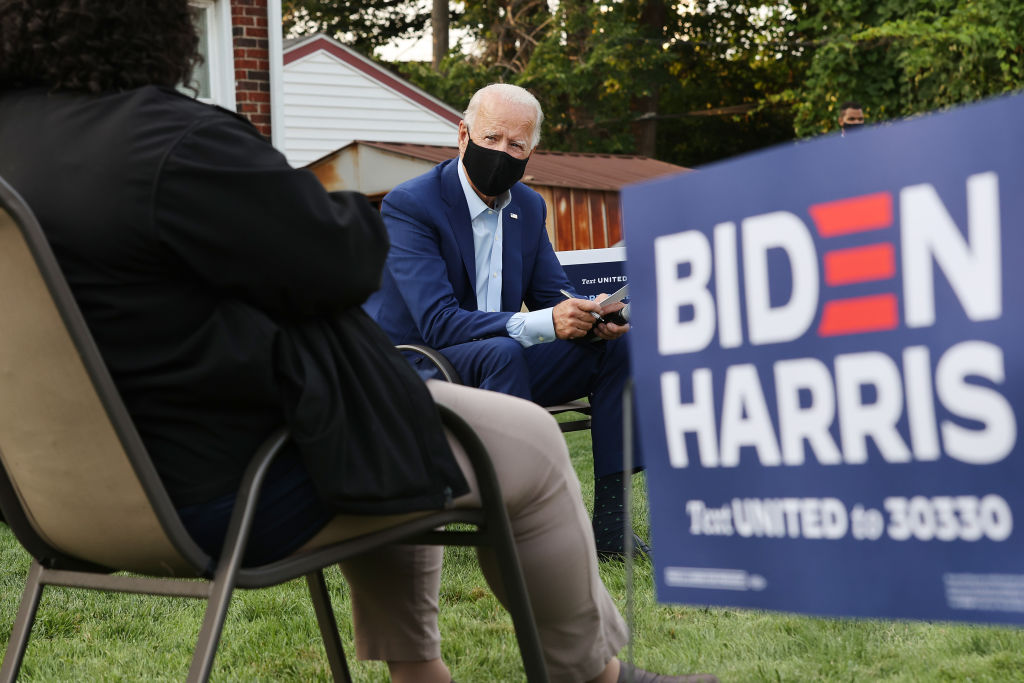
Combo photo shows U.S. President Donald Trump (R) and former U.S. Vice President Joe Biden attending their respective events on different occasions. /Xinhua
Combo photo shows U.S. President Donald Trump (R) and former U.S. Vice President Joe Biden attending their respective events on different occasions. /Xinhua
Editor's note: Tom Fowdy is a British political and international relations analyst and a graduate of Durham and Oxford universities. He writes on topics pertaining to China, the DPRK, Britain and the U.S. The article reflects the author's opinions, and not necessarily the views of CGTN.
Earlier this week, a story emerged on NBC that a fake intelligence document had been circulated by the Trump administration making claims against the son of his presidential rival Joe Biden concerning his ties to China.
The document cited a fictitious intelligence firm known as "Typhoon Investigations" and was authored by an identity known as "Martin Aspen" which analysts later affirmed does not exist.
The document was later linked to a scholar, known for his anti-China views, Christopher Balding, who last worked at Fulbright University Vietnam.
Balding took credit for writing parts of the report and acknowledged the author was a false identity, but defended it saying that it was an anonymous alias for a confidential author.
He stated that the Hong Kong dissident newspaper the Apple Daily had commissioned it to him, something they later confirmed. Despite the dubious nature of the entire document, it nonetheless went viral on the internet and was weaponized (as designed) as part of a broader effort to attempt to discredit Biden which has been the primary republican line of attack.
This is not the first time the aforementioned scholar has worked with the Trump administration to disseminate content designed to push its agenda on China.
Last July, Balding also published a paper purporting to verify the alleged links of Huawei to the leadership of the Communist Party of China, of a high questionable methodology that was not peer reviewed, which was subsequently used by Mike Pompeo and described to the press as "Smoking Gun" proof to pressure the British government, which at the time before political priorities changed they did not buy.
But the revelation is not so much about this individual as it is concerning how the Trump administration actively weaponizes a broader field of misinformation and falsehoods to push its agenda on China and set a media narrative, something it does not get sufficient scrutiny for.

Democratic presidential nominee Joe Biden (C) during a meeting in a supporter's backyard, Detroit, Michigan, U.S., September 9, 2020. /Getty Images
Democratic presidential nominee Joe Biden (C) during a meeting in a supporter's backyard, Detroit, Michigan, U.S., September 9, 2020. /Getty Images
A great deal of the Trump administration's talking points on China are simply outright falsehoods at worst and misleading at best.
This is an administration known for its dishonesty, on other topics this is not questioned, but the mainstream media have a habit otherwise of taking its foreign policy narratives at face value and repeating them, than scrutinizing them.
This has included a running theme of so-called "reports" or "dossiers" which do not constitute good faith research at all, but are designed merely to affirm the narrative.
For example, the White House aggressively peddled conspiracy theories throughout the year saying that COVID-19 originated in a laboratory and also sought to pin their own failures on Beijing.
In doing so, Mike Pompeo claimed that there was "intelligence" which verified these claims and subsequently distributed false information to right-wing newspapers throughout the West. In demonizing China, the secretary of state does so routinely, yet rarely if ever is this questioned.
These political tactics have also frequently involved the use of U.S.-sponsored think tanks, supportive media organizations and other affiliated scholars who seek to supplement the narrative. Whilst this is a longstanding mechanism of Washington, D.C politics, hence the established strategy of "manufacturing consent" from the public (such as weapons of mass destruction), the Trump administration has arguably taken this to a new level and of a much more malicious outlook, utilizing it even to serve its own electoral ends.
Thus, here, we see a collaborative attempt between the White House and a Hong Kong news organization (persistently linked to foreign collusion) to weaponize false information in a bid to undermine Joe Biden's presidential campaign with the long term view of prolonging its anti-China agenda.
It's not research; it's an electorally induced smear campaign at best. Yet the mainstream media are obsessed with so-called "Chinese misinformation and propaganda" when those linked to the administration itself in peddling falsehoods.
The binary assumption of "Western truth" vs. "Chinese propaganda" continues to a blindspot in deceiving audiences away from where the true deception ultimately lies.
Given this, is it not time to question the authenticity of other so called reports, affiliated think tanks and research with a vested interest in the administration's anti-China agenda? For example, Peter Navarro faced no consequences for his credibility in fabricating his own source "Ron Vara" in some of his work and is allowed to continue in shaping the anti-China narrative.
This story is a storm in a teacup at best, yet it should ideally serve as a big red flag in how the U.S. foreign policy narrative is committed to dishonesty and misinformation on an industrial scale, even to re-elect itself.
(If you want to contribute and have specific expertise, please contact us at opinions@cgtn.com.)